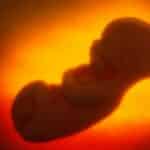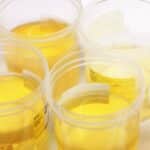Tea is one of the most popular beverages worldwide, with over 3.8 billion gallons of tea consumed in the US in 2018.
And many women continue to enjoy this beverage throughout their pregnancy. But it is crucial that you monitor your intake of certain foods and beverages and tea is one of them as it contains caffeine.
Although tea is considered a good option while you are pregnant, most varieties contain both sugar and caffeine. Iced tea and sweet tea are two of these varieties, so let’s have a look to see if they are considered safe to consume while pregnant.
Caffeine During Pregnancy
It is recommended that you limit your caffeine intake while you are pregnant to a maximum of 300mg per day.
Black, green, white, matcha, chai, and oolong teas all contain caffeine. They are all sourced from the leaves of the Camellia Sinensis plant.
Here is the approximate amount of caffeine per cup that each tea provides.
| Tea Type | Amount of caffeine per cup |
| Matcha | 60-80 mg |
| Oolong tea | 35-58 mg |
| Black tea | 47-53 mg |
| Chai | 47-53 mg |
| White tea | 25-50 mg |
| Green tea | 29-49 mg |
Caffeine easily crosses the placenta and enters your baby’s system. But your baby’s immature liver has great difficulty breaking it down.
This is why infants are far more likely to experience side effects from caffeine amounts that are considered safe for adults.
Research has suggested that those babies exposed to high levels of caffeine during pregnancy have a higher risk of being born preterm, with birth defects, or with low birth weights.
Consuming high amounts of caffeine during pregnancy can also increase your risk of miscarriage or stillbirth.
These risks are lowered considerably when pregnant women limit their caffeine intake to a maximum of 300 mg per day.
Tea does contain less caffeine than coffee and is considered safer to drink while pregnant. But the amount consumed per day needs to be limited to avoid consuming too much caffeine.
View in gallery
Can Pregnant Women Drink Iced Tea or Sweet Tea?
Commercially made iced tea contains large quantities of sugar and is not recommended during pregnancy.
But if you are craving it, then it would be better to opt for a home-made variety where you can control the amount of sugar, or even substitute the sugar for honey.
Homemade iced tea made with reduced sugar or honey is safe to drink while you are pregnant. You can safely enjoy 3-4 cups a day although that may be a little excessive for good health.
Benefits of Drinking Iced Tea During Pregnancy
Tea is one of the healthiest drinks that pregnant women can consume. Here are some of the benefits of drinking iced tea while pregnant:
Instant refreshment
If you have ever been pregnant during the hot summer months you will understand how a glass of iced tea can be a life saver.
It can also help with morning sickness during those early months. The caffeine will also help give you a little pick me up and you can always add a variety of flavors.
Antioxidants
Hormone fluctuations that occur while you are pregnant can increase the free radicals in your body. Tea is rich in antioxidants and will help to protect your cells from these free radicals and help to prevent DNA damage.
Activates brain
One of the temporary symptoms of pregnancy for many women is clumsiness and becoming forgetful. Iced tea can help to activate your brain and keep it healthy throughout pregnancy.
Tooth decay
Many women suffer from oral problems while they are pregnant. Drinking iced tea can help to reduce and even prevent the risk of dental cavities.
Gestational Diabetes
Choosing unsweetened, homemade iced tea can help to lower the risk of gestational diabetes.
While drinking iced tea can have great benefits you do need to keep a check on the amount you are consuming.
Drawbacks of Drinking Iced Tea During Pregnancy
There are a few drawbacks to drinking tea in general while you are pregnant when consumed in excess.
Caffeine Overload
Drinking tea in excessive amounts will cause caffeine overload which can increase your risk of miscarriage, stillbirths, and babies born with low birth weights.
Folic Acid
Caffeine will interfere with folic acid absorption. This can increase the chance of neural tube defects such as spina bifida.
Iron Absorption
Iced tea can inhibit your body’s ability to absorb iron and so leaving you vulnerable to anemia.
Diuretic
Tea is a diuretic and increases the amount that you urinate. This could potentially lead to dehydration as well as the loss of essentials salts and minerals from your body.
Insomnia
Tea contains caffeine which can cause sleeping problems, especially if you drink it just before bed.
It is recommended that you do not consume more than 200mg of caffeine a day to avoid these drawbacks.
Herbal Tea Risks
View in gallery
Although herbal teas contain no caffeine there are some that are considered unsafe to consume while pregnant. They may contain compounds that are considered unsafe for pregnant women and could have potential side effects.
Here are some of those teas that are considered unsafe during pregnancy:
Risk of miscarriage or preterm labor
- fennel
- fenugreek
- sage
- vervain
- borage
- pennyroyal
- licorice
- thyme
- motherwort
- lovage
- blue cohosh
- black cohosh
- frankincense (in large amounts)
- chamomile (in large amounts)
Menstrual bleeding
These teas may increase menstrual bleeding.
- motherwort
- lovage
- frankincense
Birth defects
These teas may increase the risk of birth defects.
- motherwort
- borage
Contaminated Teas
Teas are not regulated or strictly tested and this can potentially mean that women are drinking contaminated tea. They could be contaminated with things such as heavy metals.
One study tested off-the-shelf black, green, white, and oolong teas. It found that 20% of all the samples were contaminated with aluminum and 73% of all the samples contained lead levels that were considered unsafe while pregnant.
Due to the lack of regulation, there is the risk that herbal teas may contain ingredients that are not listed on their label.
Unfortunately, it is impossible to eliminate this risk. But you can minimize it by only purchasing tea from reputable brands.
Teas That Are Safe During Pregnancy
Most caffeinated teas are considered safe to drink while pregnant as long as you keep your caffeine intake below 300 mg.
Herbal teas have had little research regarding their side effects during pregnancy. But there are a few that are considered safe to drink while pregnant:
- Raspberry leaf – Is believed to be safe and also shorten labor by helping to prepare the uterus for birth.
- Peppermint – Another tea that is considered safe and often used to help relieve gas, nausea, stomach pain, or heartburn.
- Ginger – Research suggests it reduces nausea and vomiting. But when it is consumed dried it should not exceed 1 gram per day.
- Lemon balm – Used to help relieve anxiety, irritability, and insomnia.
There is very little if any research on whether herbal teas are considered safe or not while pregnant. So it may be best to consume in small quantities and if you have any unwanted side effects to consult a doctor as soon as possible.
The Final Thought
Although there are many things that you have to give up while you are pregnant iced tea is not one of them. But you do need to consider the amount of sugar that is in pre-packaged iced tea.
You also need to ensure that your caffeine intake remains below 300 mg per day. As long as you are not suffering any side effects from your consumption of iced or sweet tea there is no reason that you can not enjoy a glass every day!






